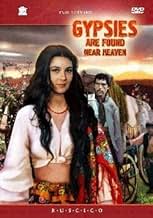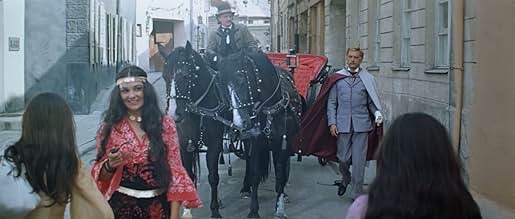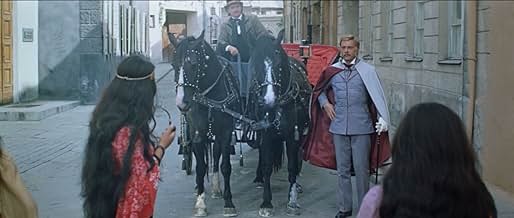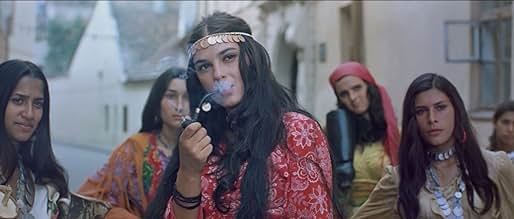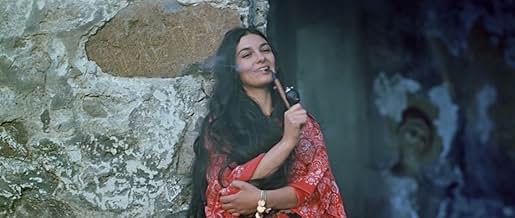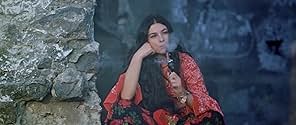CALIFICACIÓN DE IMDb
7.3/10
2 k
TU CALIFICACIÓN
Agrega una trama en tu idiomaRada, a beautiful and very proud gipsy girl is used to steal men's hearts and monk them. Zobar is a horse thief who's heart is stolen by Rada and his mind is bewitched. He is ready to give u... Leer todoRada, a beautiful and very proud gipsy girl is used to steal men's hearts and monk them. Zobar is a horse thief who's heart is stolen by Rada and his mind is bewitched. He is ready to give up his freedom but not his pride.Rada, a beautiful and very proud gipsy girl is used to steal men's hearts and monk them. Zobar is a horse thief who's heart is stolen by Rada and his mind is bewitched. He is ready to give up his freedom but not his pride.
- Dirección
- Guionistas
- Elenco
- Premios
- 1 premio ganado y 1 nominación en total
Grigore Grigoriu
- Loiko Zobar
- (as Grigori Grigoriu)
Barasbi Mulayev
- Makar Chudra
- (as B. Mulayev)
Boryslav Brondukov
- Bucha
- (as Borislav Brondukov)
Vasyl Symchych
- Balint
- (as Vasili Simchich)
- Dirección
- Guionistas
- Todo el elenco y el equipo
- Producción, taquilla y más en IMDbPro
Opiniones destacadas
A movie that could only have been made in the 70s. Very free and very lyrical. Poetic but still very earnest with a touch of nudity. While nudity nowadays is not a big deal, I suppose it was back then (even through all the Flower Power movement). And therefor it got special mention before the screening (this year, 2010).
This shouldn't be the reason for you to watch the movie though. There is other movies out there ready to be explored, if you are looking for that kind of thing. This movie on the other hand, just lives the free spirit and does not take a particular road. Or tells a great story for that matter. It's all about humans and gypsies in general (though that might not be the political correct term to call them). And a promise the movie makes, that is kept in the end ... not that you did not see that coming ... just saying
This shouldn't be the reason for you to watch the movie though. There is other movies out there ready to be explored, if you are looking for that kind of thing. This movie on the other hand, just lives the free spirit and does not take a particular road. Or tells a great story for that matter. It's all about humans and gypsies in general (though that might not be the political correct term to call them). And a promise the movie makes, that is kept in the end ... not that you did not see that coming ... just saying
In the film there is no Romanian cast, all of the characters are played by Soviet actors. Moreover, with all of more or less authentic Gypsy features it has nothing to do with actual Gypsies. Gypsies here are metaphoric of some kind of people who follow different laws and rules than ordinary people; they are people who prefer the spiritual to the material, freedom to routine, passion to compromise, etc. With this approach most of the criticism expressed in some of the previous comments becomes irrelevant.
In the USSR there was no sex, it's true. There was passion and love -- love that burns.
Love that burns -- that's what the film tells about, and for this good cause all means is of use: transgression, tantra, pagan cults, dionysism, dark magic. This story can be named as well a Russian Carmen. Brilliant performance of Emil Lotjanu (director), Eugene Doga (music), Serguey Vronsky (photography), Svetlana Toma (awarded as the best Soviet actress of the year for the part of Rada), Grigore Grigoriu(Zobar), Borislav Brondukov (Buca) and others. Great art of a great civilization. Get it and enjoy seeing.
In the USSR there was no sex, it's true. There was passion and love -- love that burns.
Love that burns -- that's what the film tells about, and for this good cause all means is of use: transgression, tantra, pagan cults, dionysism, dark magic. This story can be named as well a Russian Carmen. Brilliant performance of Emil Lotjanu (director), Eugene Doga (music), Serguey Vronsky (photography), Svetlana Toma (awarded as the best Soviet actress of the year for the part of Rada), Grigore Grigoriu(Zobar), Borislav Brondukov (Buca) and others. Great art of a great civilization. Get it and enjoy seeing.
it is simply the best gypsy movie, translating so well their thirst of
freedom, for 'the road'...i saw it on tv as 'Les Tziganes s'en vont
vers les cieux, in a children-family program, but i think it surpasses
all the Kusturica-Gatlif spoofs depicting Gypsies. This one here depicts all the tragedy of the gypsy people, torn
between materialism and freedom. The opening is a piece of anthology as the old sage predicts
Zabor his near future and warns him : Dont trust any woman...and
remember that freedom is the most important value...' And ahhh....Svetlana!!! so marvelous dancing and saying to Zabor
: 'Dont look at me this way, it's forbidden...' To see for the proudness, the height of the feelings, the friendship,
the love, so pure....but leading to tragic endings in a gadjo world... a must for gypsy-movies lovers as much as : Autrefois, nous étions des oiseaux, from Garri
Bardine
freedom, for 'the road'...i saw it on tv as 'Les Tziganes s'en vont
vers les cieux, in a children-family program, but i think it surpasses
all the Kusturica-Gatlif spoofs depicting Gypsies. This one here depicts all the tragedy of the gypsy people, torn
between materialism and freedom. The opening is a piece of anthology as the old sage predicts
Zabor his near future and warns him : Dont trust any woman...and
remember that freedom is the most important value...' And ahhh....Svetlana!!! so marvelous dancing and saying to Zabor
: 'Dont look at me this way, it's forbidden...' To see for the proudness, the height of the feelings, the friendship,
the love, so pure....but leading to tragic endings in a gadjo world... a must for gypsy-movies lovers as much as : Autrefois, nous étions des oiseaux, from Garri
Bardine
Moldovan director Emil Loteanu's tenth feature film is probably his most famous one. "Gypsies Are Found Near Heaven" (1976) was a huge hit in the USSR, the most watched film in cinemas that year and also something that the critics fancied. The film, based on two stories by Maxim Gorki, is a depiction of wandering Gypsies in the turn-of-the-century Austria-Hungary. These people travel from one place to the next without staying long. They dance, they sing, and they fall in love.
Loteanu's film is very colorful and kind of other-worldly in its depiction of history. Though it is supposed to be taking place in 1900 or something, the gypsies at times look like 1970's hippies, and the look of the film is a tad anachronistic. It is not a narrative-driven film, but instead focuses on the atmosphere. There is a lot of gypsy music in it, which was historically interesting, and many of the songs were a joy to listen to. As a depiction of a disappearing way of life, this film works well. As a well-thought-out artistic experience, it's pretty messy. Some will like it more than others.
Loteanu's film is very colorful and kind of other-worldly in its depiction of history. Though it is supposed to be taking place in 1900 or something, the gypsies at times look like 1970's hippies, and the look of the film is a tad anachronistic. It is not a narrative-driven film, but instead focuses on the atmosphere. There is a lot of gypsy music in it, which was historically interesting, and many of the songs were a joy to listen to. As a depiction of a disappearing way of life, this film works well. As a well-thought-out artistic experience, it's pretty messy. Some will like it more than others.
This movie is a sweet melodrama about the life and the customs of gypsies in the past century. One of the main aspects that one may consider before watching this movie is the soundtrack, which contains several gypsy songs (original, with Romany words) flavored with some masterpieces of the well known Moldavian soundtrack composer Eugen Doga.
Unlike other movies, this film marches deep into the past revealing a world completely unknown to most of the present day individuals, an almost ancient time when gypsies were just a tribe of ill-behaved, rebellious people wandering from one place to another. Everything is covered with a haze of magic and archaic. It was a time when killing and getting killed for a fistful of gold or a horse were the order of the day, when people believed in sorcery and magic. It was a time when the traditions perpetuated orally, when "a capella" singing (rarely aided by a background violin or guitar) rather than big-band Bregovic-like events was the way to express one's grief or happiness. Listen to "I am dying mother" or "Phabaj" to understand what I mean!
Essentially the script tells an uncommon and passionately love story between a horse thief, Zobar, and a young gypsy witch, Rada. The script is a little bit unpolished making the impression of a "pink novel", but the music and the images (not to mention the beauty & talent of Svetlana Toma) balance quite well the not so very thick plot.
9/10 - for picturing so well a world lost to the ravages of time.
Unlike other movies, this film marches deep into the past revealing a world completely unknown to most of the present day individuals, an almost ancient time when gypsies were just a tribe of ill-behaved, rebellious people wandering from one place to another. Everything is covered with a haze of magic and archaic. It was a time when killing and getting killed for a fistful of gold or a horse were the order of the day, when people believed in sorcery and magic. It was a time when the traditions perpetuated orally, when "a capella" singing (rarely aided by a background violin or guitar) rather than big-band Bregovic-like events was the way to express one's grief or happiness. Listen to "I am dying mother" or "Phabaj" to understand what I mean!
Essentially the script tells an uncommon and passionately love story between a horse thief, Zobar, and a young gypsy witch, Rada. The script is a little bit unpolished making the impression of a "pink novel", but the music and the images (not to mention the beauty & talent of Svetlana Toma) balance quite well the not so very thick plot.
9/10 - for picturing so well a world lost to the ravages of time.
¿Sabías que…?
- ConexionesFeatured in Legendy mirovogo kino: Emil Loteanu
- Bandas sonorasNane Tsokha
Performed by Alyona Buzylyova
Selecciones populares
Inicia sesión para calificar y agrega a la lista de videos para obtener recomendaciones personalizadas
- How long is Queen of the Gypsies?Con tecnología de Alexa
Detalles
- Tiempo de ejecución1 hora 41 minutos
- Color
- Relación de aspecto
- 2.20 : 1
Contribuir a esta página
Sugiere una edición o agrega el contenido que falta

